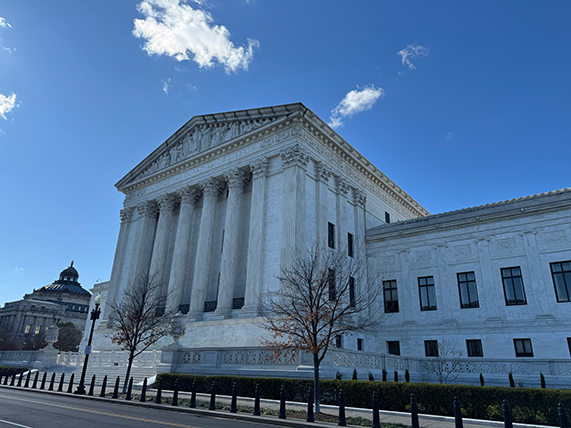WASHINGTON – Supreme Court justices appeared skeptical of allowing prisoners to sue government officials for damages during oral arguments Monday.
The case involves Damon Landor, a devout Rastafarian who vowed never to cut his hair as a part of his faith, a promise known as the Nazarite vow. Landor was serving a five-month sentence at a Louisiana prison on a drug charge. When he was transferred to a new facility, Landor’s hair was shaved against his will by two guards who carried him to another room and handcuffed him to a chair, according to records.
He handed guards an appeals court ruling that shaving a Rastafarian inmate’s dreadlocks violates the Religious Land Use and Institutionalized Persons Act of 2000 (RLUIPA), but the guards threw it in the trash and shaved him anyway. Landor sued the warden and the guards under RLUIPA, which prohibits federally funded state prisons from placing a “substantial burden” on prisoners’ religious exercise.
RLUIPA is a sister statute to the Religious Freedom Restoration Act of 1993 (RFRA). In a 2020 decision, the justices unanimously ruled that RFRA, which has nearly identical language to RLUIPA, does allow people to seek damages against federal prison officials acting in their individual capacities.
The United States filed an amicus brief in support of Landor, pivoting from the position it took in the RFRA case.
Justice Amy Coney Barrett said the facts of this case “are egregious.” But, she argued, it was unclear there was any precedent for a non-recipient of federal funds to be held individually liable under a federal statute.
Louisiana takes the same position. According to the state, RLUIPA operates like a contract between the federal government and the state. Louisiana claims that the warden and guards cannot be sued under RLUIPA “because they are not recipients of federal funding.”
All prior federal appeals court rulings have agreed that RLUIPA doesn’t authorize damages.
“Every circuit had said there were not damages actions available against non-recipients under RLUIPA,” Barrett said. “So it’s hard to see how it could be clear to the states that were accepting the money or the prisons accepting the money.”
The U.S. Court of Appeals for the Fifth Circuit unanimously affirmed the lower court’s decision to dismiss Landor’s claim under Fifth Circuit precedent. Because RLUIPA was enacted under Congress’s Spending Clause, the Fifth Circuit argued “only the grant recipient—the state—may be liable for its violation.”
Lawyers for Landor, however, argue that RLUIPA authorizes suits against individuals under the precedent set by the Supreme Court on RFRA.
The two laws “clearly mean the same thing,” according to Zachary Tripp, Landor’s attorney. “The whole point of individual capacity is to have damages… and without damages, officials can literally treat the law like garbage,” he said.
Under RLUIPA’s cause of action, a person may obtain “appropriate relief against a government” for violations. The Supreme Court’s conservative majority seemed unconvinced the law was clear enough to authorize suits.
“The hard part, as I see it for your case, for me, is that you need a clear statement,” Justice Brett Kavanaugh said. “And ‘appropriate relief’ is not as clear as it could be in encompassing damages.”
The Supreme Court’s liberal justices seemed more inclined to support Landor’s case. They heavily questioned Jorge Benjamin Aguiñaga, lawyer for the Louisiana Department of Corrections.
Justice Sonia Sotomayor said, “you’re saying at the same time that the warden, who is cutting the individual’s hair, should know that that’s a violation of the state, for which an injunction should be liable, but he shouldn’t know that he’s liable for personal damages too?”
Aguiñaga responded, “that’s what 10 federal courts of appeals have said.”
The National Sheriffs’ Association is the only organization to file an amicus curiae brief in support of Louisiana in the case.
Sheriff Greg Champagne, chair of the National Sheriffs’ Association’s legal affairs committee, said that while the facts of the case were “egregious,” a ruling for Landor could enable excessive lawsuits that would strain the prison and court systems.
“We’re concerned about that, kind of open in the floodgates, that it would be expensive, it would be burdensome… it would burden not only government agencies, it would burden the courts,” he said.
Former federal prison aid and Rastafarian Charles Price said employees at state and local prisons are often unaware of prisoners’ religious practices, and the case could place an important check on rights violations.
“If you give incarcerated people the opportunity to sue for individual damages, and they have the evidence for a case, that should have a chilling effect on prison officials misbehaving,” the anthropology professor said. “I do think it would kind of ratchet up the rights of individuals to protect themselves in instances of abuse.”
The Supreme Court is expected to decide the case by next summer.


